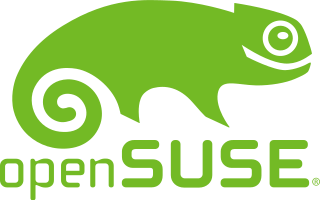Related Research Articles

openSUSE is a free and open source RPM-based Linux distribution developed by the openSUSE project.

SUSE is a German-based multinational open-source software company that develops and sells Linux products to business customers. Founded in 1992, it was the first company to market Linux for enterprise. It is the developer of SUSE Linux Enterprise and the primary sponsor of the community-supported openSUSE Linux distribution project. While the openSUSE "Tumbleweed" variation is an upstream distribution for both the "Leap" variation and SUSE Linux Enterprise distribution, its branded "Leap" variation is part of a direct upgrade path to the enterprise version, which effectively makes openSUSE Leap a non-commercial version of its enterprise product.

BeeGFS is a parallel file system, developed and optimized for high-performance computing. BeeGFS includes a distributed metadata architecture for scalability and flexibility reasons. Its most used and widely known aspect is data throughput.
Sheng Liang is the CEO and Co-Founder of Rancher Labs.

OpenShift is a family of containerization software products developed by Red Hat. Its flagship product is the OpenShift Container Platform — a hybrid cloud platform as a service built around Linux containers orchestrated and managed by Kubernetes on a foundation of Red Hat Enterprise Linux. The family's other products provide this platform through different environments: OKD serves as the community-driven upstream, Several deployment methods are available including self-managed, cloud native under ROSA, ARO and RHOIC on AWS, Azure, and IBM Cloud respectively, OpenShift Online as software as a service, and OpenShift Dedicated as a managed service.
CloudStack is open-source cloud computing software for creating, managing, and deploying infrastructure cloud services. It uses existing hypervisor platforms for virtualization, such as KVM, VMware vSphere, including ESXi and vCenter, and XenServer/XCP. In addition to its own API, CloudStack also supports the Amazon Web Services (AWS) API and the Open Cloud Computing Interface from the Open Grid Forum.

Zerto provides disaster recovery, ransomware resilience and workload mobility software for virtualized infrastructures and cloud environments. Zerto is a subsidiary of Hewlett Packard Enterprise company which is headquartered in Spring, Texas, USA.
Google Cloud Platform (GCP), offered by Google, is a suite of cloud computing services that runs on the same infrastructure that Google uses internally for its end-user products, such as Google Search, Gmail, Google Drive, and YouTube. Alongside a set of management tools, it provides a series of modular cloud services including computing, data storage, data analytics and machine learning. Registration requires a credit card or bank account details.

DigitalOcean Holdings, Inc. is an American multinational technology company and cloud service provider. The company is headquartered in New York City, New York, USA, with 15 globally distributed data centers worldwide. DigitalOcean provides developers, startups, and SMBs with cloud infrastructure-as-a-service platforms.
Kubernetes is an open-source container orchestration system for automating software deployment, scaling, and management. Originally designed by Google, the project is now maintained by the Cloud Native Computing Foundation.

Mirantis Inc. is a Campbell, California, based B2B open source cloud computing software and services company. Its primary container and cloud management products, part of the Mirantis Cloud Native Platform suite of products, are Mirantis Container Cloud and Mirantis Kubernetes Engine. The company focuses on the development and support of container and cloud infrastructure management platforms based on Kubernetes and OpenStack. The company was founded in 1999 by Alex Freedland and Boris Renski. It was one of the founding members of the OpenStack Foundation, a non-profit corporate entity established in September, 2012 to promote OpenStack software and its community. Mirantis has been an active member of the Cloud Native Computing Foundation since 2016.
A bare-metal server is a physical computer server that is used by one consumer, or tenant, only. Each server offered for rental is a distinct physical piece of hardware that is a functional server on its own. They are not virtual servers running in multiple pieces of shared hardware.
D2iQ is an American technology company based in San Francisco, California which develops software that simplifies Kubernetes lifecycle management, deployment to hybrid, multi-cloud, and edge environments and enables advanced application use cases. Its flagship product is called the D2iQ Kubernetes Platform (DKP).
DataCore, also known as DataCore Software, is a developer of software-defined storage based in Fort Lauderdale, Florida, United States. The company is a pioneer in the development of SAN virtualization technology, and offers software-defined storage solutions across core data center, edge and cloud environments.
Rancher may refer to:
Container Linux is a discontinued open-source lightweight operating system based on the Linux kernel and designed for providing infrastructure to clustered deployments, while focusing on automation, ease of application deployment, security, reliability and scalability. As an operating system, Container Linux provided only the minimal functionality required for deploying applications inside software containers, together with built-in mechanisms for service discovery and configuration sharing.
The Cloud Native Computing Foundation (CNCF) is a Linux Foundation project that was founded in 2015 to help advance container technology and align the tech industry around its evolution.
Containerization is operating system-level virtualization or application-level virtualization over multiple network resources so that software applications can run in isolated user spaces called containers in any cloud or non-cloud environment, regardless of type or vendor.
Harvester is a hyper-converged infrastructure (HCI) free software software, that is intended for use on common servers in e.g. a private cloud. Harvester was announced in 2020 by SUSE.
References
- 1 2 Lardinois, Frederic (May 9, 2016). "Rancher Labs raises $20M Series B round for its container management platform". Tech Crunch. Retrieved June 17, 2017.
- ↑ "Rancher Labs Raises $40 Million Series D Round to Accelerate Growth of Its Kubernetes Management Platform". Rancher Labs. 2020-03-16. Retrieved 2020-05-14.
- ↑ "Rancher Labs Opens Rancher Academy". Container Journal. May 19, 2020.
- ↑ "Rancher Labs Simplifies Kubernetes Lifecycle Management". Container Journal. April 3, 2020.
- ↑ Novet, Jordan (July 8, 2020). "Linux company SUSE outbids competitors for fast-growing start-up Rancher Labs". CNBC.
- ↑ "SUSE completes Rancher Labs acquisition". Suse.com. Dec 1, 2020.